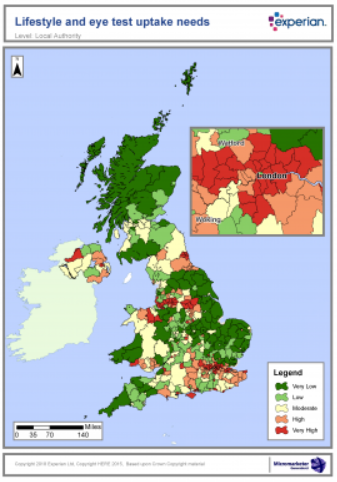Addressing Eye Health for All
Eye health is a concern that affects everyone. Many factors related to public health and regional healthcare priorities can have a significant impact on the eye health of our local population in Northumberland, Tyne, and Wear (NTW). Lifestyle choices such as obesity, smoking, and a lack of physical activity can increase the risk of avoidable vision problems. Additionally, certain eye conditions are more prevalent in specific ethnic groups. Living with vision loss can affect one’s independence, lead to social isolation, and impact mental well-being. In this report, we aim to shed light on the current and potential role that optometry can play in enhancing the overall health outcomes of the Northumberland, Tyne, and Wear (NTW) population.
The Challenge of Avoidable Sight Loss:

A map created for National Eye Health Week in 2018 highlighted areas across the UK, including the North East, where unhealthy lifestyle habits and inadequate health screening put residents at significant risk of vision loss. To mitigate this risk, it is crucial to focus on prevention and early detection of common eye conditions. By doing so, we can reduce the number of people experiencing unnecessary vision problems.
Early Detection through GOS Sight Tests
NHS-funded Sight Tests (GOS) serve as a primary means to determine if one requires prescription glasses for everyday or specific tasks. Beyond this function, these tests offer a valuable opportunity to detect eye diseases and some systemic conditions, often before any symptoms are noticed.
Many individuals who require glasses typically attend routine sight tests. However, a significant number remain unaware that they may be eligible for NHS-funded Sight Tests, which can also contribute towards obtaining new glasses. Additionally, individuals who are unable to visit a community-based optometrist independently due to physical or mental disability might not realize that all optometrists either provide home-based (domicilliary) services themselves or can refer patients to a colleague who does.
Enhancing Vision for Fall Prevention
Falls are a prevalent issue across the UK, especially among individuals aged over 65. In fact, they are the primary reason for hospitalizations in this age group, and the leading cause of accidental death for those aged over 75. A significant contributor to these incidents is undiagnosed and untreated visual impairment, along with inappropriate eyewear. Detecting and addressing vision issues can significantly reduce the risk of falls among older individuals.
For additional information and helpful videos, please visit this link.
Managing Dementia with Proper Eye Care
It is estimated that at least 250,000 people in the UK are coping with both sight loss and dementia. Sight tests are thoughtfully designed to accommodate individuals with varying cognitive abilities, including those living with dementia. Even individuals facing cognitive challenges can undergo a comprehensive sight test. Maintaining good eye health is especially crucial in cases of cognitive impairment, as poor eyesight is linked to disease progression.
Promoting Vision Wellness in the Elderly
The risk of sight loss tends to increase with age. Optical practices, as an integral part of the primary care network, establish strong connections with the communities they serve. This relationship-building provides valuable opportunities to detect frailty in its early stages and allows optometrists to guide people towards the support they need. Additionally, identifying eye diseases before they lead to visual impairment can help slow the progression of frailty, preserving independence, and reducing the risk of falls.
Collaborating with the Optical Workforce
The NTW LOC is committed to fostering stronger ties between local Falls Services and primary care optometrists. We invite you to reach out to us for further discussions on this matter. NTW LOC is also interested in exploring the implementation of the nationally advocated Healthy Living Optical Practice (HLOP) pathway across the NTW region.
Furthermore, the LOC is enthusiastic about exploring ways to enhance access to sight tests and improve the overall experience for populations that are traditionally hard to reach. By working closely with Integrated Care Partnerships (ICPs), we aim to prevent sight loss and promote eye health within these communities.
